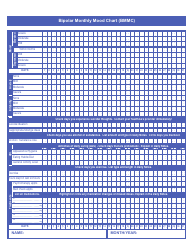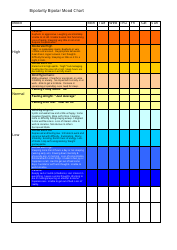Bipolar Disorder Mood Tracker
A Bipolar Disorder Mood Tracker is used to monitor and track changes in mood for individuals with Bipolar Disorder. It helps them keep a record of their mood swings, identify patterns, and provide useful information to their healthcare providers for treatment planning.
The individual diagnosed with bipolar disorder typically files the mood tracker.
FAQ
Q: What is Bipolar Disorder?
A: Bipolar Disorder is a mental health condition marked by extreme shifts in mood, energy, and activity levels.
Q: What are the symptoms of Bipolar Disorder?
A: Symptoms of Bipolar Disorder can include alternating periods of mania (elevated mood, increased energy) and depression (sadness, hopelessness, low energy).
Q: What causes Bipolar Disorder?
A: The exact cause of Bipolar Disorder is unknown, but it is believed to involve a combination of genetic, biological, and environmental factors.
Q: How is Bipolar Disorder diagnosed?
A: Bipolar Disorder is diagnosed by a mental health professional who evaluates a person's symptoms, medical history, and family history.
Q: Is there a cure for Bipolar Disorder?
A: There is currently no cure for Bipolar Disorder, but it can be managed with a combination of medications, therapy, and lifestyle changes.
Q: Can Bipolar Disorder be treated?
A: Yes, Bipolar Disorder can be treated with medications (such as mood stabilizers), psychotherapy, and support from mental health professionals.
Q: Is Bipolar Disorder common?
A: Bipolar Disorder affects about 2.8% of adults in the United States, making it relatively common.
Q: Can Bipolar Disorder be prevented?
A: There is no known way to prevent Bipolar Disorder, but early intervention and treatment can help manage the symptoms and improve quality of life.
Q: What should I do if I suspect I have Bipolar Disorder?
A: If you suspect you have Bipolar Disorder, it is important to seek help from a healthcare professional who can provide an accurate diagnosis and appropriate treatment options.






